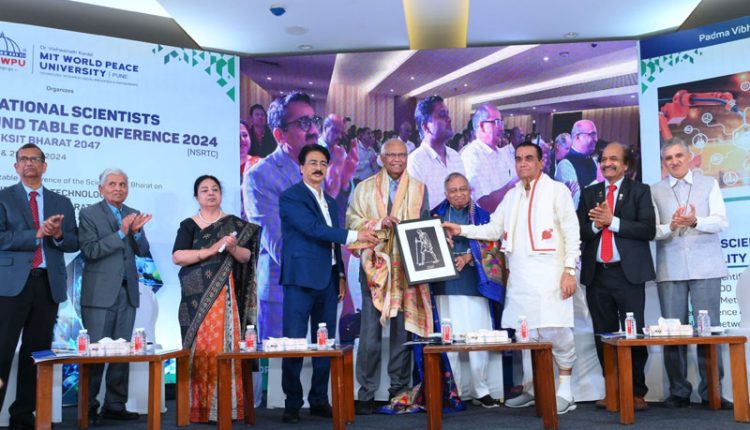National Scientists Highlight the Critical Need for Transparency and Accuracy in AI at the 1st NSRTC 2024
Pune, India–MIT World Peace University (MIT-WPU) announces the successful conclusion of the 1st National Scientists Round Table Conference (NSRTC 2024), a landmark event held from July 19 to July 21, 2024. The conference, themed “Science and Technology for Viksit Bharat 2047,” brought together esteemed dignitaries, scholars, and visionaries to discuss pivotal themes shaping India’s scientific future.
The three-day conference brought together top academicians, scientists, researchers, and scholars. The focus was on exchanging insights and research across Physical Sciences, Life Sciences, and Engineering & Technology. NSRTC 2024 highlighted key topics such as Artificial Intelligence, Quantum Technology, Science&Spirituality, Sustainability, Healthcare and World Peace. The event aimed to spark innovative ideas, especially among young researchers, and promote interdisciplinary and global collaborations for new discoveries and sustainable development.
Dr. Sujata Chaklanobis, Former Advisor/Scientist G, DSIR, New Delhi, was the Chief Guest at the Valedictory function of NSRTC-24. Distinguished attendees included Hon’ble Padma Vibhushan Dr. R. A. Mashelkar, Mr. Ganpati Yadav, Former Vice-Chancellor of the Institute of Chemical Technology; Padma Bhushan Dr. Vijay Bhatkar, Founder Director of C-DAC, Pune; UNESCO Chair Holder Prof. Dr. Vishwanath D. Karad, Founder President of MIT-WPU; Shri. Rahul V. Karad, Executive President of MIT-WPU, Dr. Sunil S Bhagwat, Director, Indian Insititute of Science Education and Research, Pune and NSRTC National Convener Prof. Dr. Milind Pande and Prof. Dr. Bharat B. Kale.
Dr. Sasikumar M. Executive Director, C-DAC, Mumbai said“The successful conclusion of the 1st National Scientists Round Table Conference (NSRTC 2024) represents a significant milestone for science and technology in India. Our discussions on Artificial Intelligence revealed both its vast potential and the challenges it presents. While AI holds great promise, it must be approached with caution, ensuring accuracy and transparency to avoid biases. This conference has fostered valuable interdisciplinary collaboration and set a new benchmark for advancing our vision of a sustainable, equitable future. I am immensely proud of what we have achieved and excited about the path ahead.”
Dr. Sujata Chaklanobis, Former Advisor/Scientist G, DSIR, New Delhi, and Chief Guest at the Valedictory function of NSRTC-24, emphasized the vision of Vikasit Bharat @2047. She highlighted that this dream can be achieved through science and technology interventions, urging scientists and young scholars to engage in cutting-edge research to address the nation’s challenges. She congratulated MIT-WPU for organizing the NSRTC 2024, where the nation’s brightest minds deliberated on crucial topics.
UNESCO Chair Holder Revered Prof. Dr. Vishwanath D. Karad, Founder President of MIT-WPU said, “Over the past three days, we have witnessed remarkable exchanges of ideas and groundbreaking discussions on the future of science and technology. The convergence of eminent scientists, researchers, and visionaries at MIT-WPU underscores our collective commitment to fostering innovation and interdisciplinary collaboration. As we strive to build a sustainable and equitable future, NSRTC 2024 has truly exemplified the spirit of scientific exploration and the pursuit of excellence, setting a precedent for future endeavours in advancing frontier technologies for the betterment of society.”
Shri. Rahul V. Karad – Executive President, MIT-WPU “At MIT-WPU, we believe in the transformative power of education and research, and this conference exemplifies our dedication to addressing critical issues such as healthcare, climate change, and digital transformation. We are honored to have hosted such a distinguished panel of experts and are excited about the breakthroughs and new ideas that have emerged from this event. The successful conclusion of the 1st NSRTC at MIT-WPU is a testament to our unwavering commitment to fostering scientific excellence and innovation. This event has inspired collaboration and dialogue among leading scientists and researchers, propelling us towards our vision for Viksit Bharat 2047. “
The conference was organized around eight key themes: Artificial Intelligence, addressing ethical frameworks, regulations, AI for social good and healthcare, and future job impacts; Biotechnology, focusing on synthetic biology, bioinformatics, biomedical devices, biopharmaceuticals, and bio-manufacturing; Digital Transformations, covering grid technology, quantum computing, blockchain, cybersecurity, and digital inclusion; Advanced Materials and Processing, including nanomaterials, organic electronics, biomimetic designs, sustainable materials, and 3D printing; Healthcare, exploring tissue engineering, regenerative medicine, wearable devices, and affordable high-tech healthcare; Science, Scientific Temper & Spirituality, examining the role of scientific temper, brain-mind-consciousness relationship, and spiritual practices; Agri-Tech, focusing on precision agriculture, genetic engineering, climate-smart agriculture, urban farming, and agritech startups; and Climate Change, addressing climate modeling, the circular economy, sustainable mobility, green buildings, and managing transitions.
NSRTC 2024 witnessed the presence of prominent130 scientists from across the country and notable figures, including Dr. Ashok Joshi, Padmashri Dr. Thallapai Pradip, Prof. Dr. M.S. Ramachandra Rao, Dr. Richard Lobo, Prof. Dr. Ajit Kulkarni, Dr. Umesh Waghmore, Dr. Dipankar Das Sharma, Dr. Dinesh Aswal, Dr. Tata A. Rao, Dr. Bhushan Patwardhan, Prof. Anil Sahasrabuddhe, Dr. Niraj Khare, Dr. K. Sami Reddy, Dr. Atul Verma, Dr. Ashok Khandkar from the USA, Dr. Sumitra, ISRO scientist Dr. Ilangovan, Prof. Krupanidhi of IAS Bangalore, Prof. Anik Kumar, ICER Director Ashok Ganguly, Dr. Rajat Mona, Prof. Das Gupta, Dr. Nag Hanumaiah, Sameer Director Hanmantrao, Sydney University Prof. Dr. Kautubh Dalal and Purdue University Prof. Sachin Pol.

